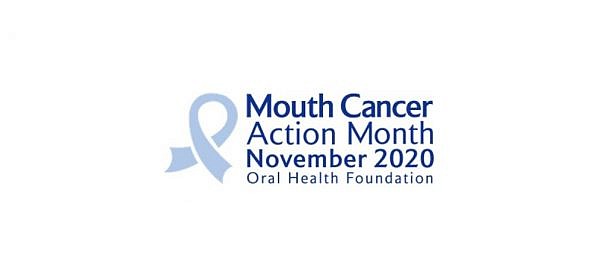Mouth Cancer Action Month: What Causes Mouth Cancer?
Mouth cancer affects around 8,300 people in the UK each year, making it the 6th most common cancer in the world. With this number continuously rising each year, mouth cancer takes more lives than cervical and testicular cancer combined.
Like all mouth cancers, detection is vital. It’s crucial to know the signs, symptoms and understand what best to reduce your chances of contracting the life-threatening disease. The more we know about mouth cancer, the better chance we have of beating it.
Dentists are natural leaders in leading the fight against mouth cancer, so when you visit your dentist for a check-up, they will carry out a mouth cancer screening to check for the signs, before you may even notice them.
Supported by the Mouth Cancer Foundation and the British Dental Health Foundation, Mouth Cancer Action Month takes place every November and highlights the importance of early detection, by raising awareness of the risks, signs and symptoms of mouth cancer.
What is Mouth Cancer?
Mouth cancer is a tumour that develops in part of the mouth, either on the inside of the cheeks, the roof of the mouth, the lips or gums, or on the surface of your tongue.
For reasons unknown, mouth cancer is more common in men than in women, with that being said, we are seeing an increased number of women diagnosed with the disease. As a large majority of mouth cancer cases are first spotted by dental health professionals during check-up appointments, it’s strongly advised to routinely visit your dentist and avoid any delays.
Mouth cancer is also more common in patients over the age of 40, however, more and more young people are now affected than before.
What Are the Symptoms of Mouth Cancer?
Common symptoms of mouth cancer include unexplained lumps in the mouth or neck that do not go away, unexplained persistent numbness, an odd feeling on the lip or tongue, unexplained loose teeth that do not heal after extractions, white or red patches on the lining of the mouth or tongue, changes in speech or, most commonly, painful mouth ulcers that do not heal.
What Causes Mouth Cancer?
Unfortunately, it’s unknown what exactly causes mouth cancer, however, we do know that up to 90% of all mouth cancers are linked to lifestyle factors. Of course, if any of the lifestyle factors apply to you, it doesn’t necessarily mean that you are certain to develop mouth cancer, but that you are likely to have a higher risk of developing it instead.
Here are some of the lifestyle factors that are linked to mouth cancer:
Smoking
Smoking is proven to increase your risk of developing mouth cancer by up to 10 times, whether it be pipes, cigars or cigarettes. Some evidence suggests that second-hand smoke in the workplace or at home can also increase the risk of mouth cancer. With more than 60% of mouth cancers linked to smoking, this is the number one contributing factor to mouth cancer.
Alcohol
With alcohol linked to 30% of all mouth cancers, it’s crucial to stick to the recommended UK guidelines of alcohol intake per week for both men and women, which currently stands at 14 units per week.
Diet
Not only is diet important for your oral health, but it can also be another contributing factor of mouth cancer, with a third of mouth cancers thought to be linked to an unhealthy diet. Our best advice is to eat a healthy and balanced diet, with lots of fruit and vegetables, as well as consuming foods high in Omega 3 and fibre.
HPV
Research also suggests that HPV (also known as the human papillomavirus) is another top contributing factor. In order to reduce the risk of contracting HPV, it’s important to practice safe sex and limit the number of partners you have.
Genetics & Cancer History
Unfortunately, if you have a family history of cancer or if you have had mouth cancer before, then you may be slightly more at risk of developing mouth cancer than those without a cancer history. If you are in this higher-risk bracket, it’s critical to visit your dentist more frequently.
How Common Is Mouth Cancer?
While mouth cancer isn’t as common as other forms of cancer, it is still the 6th most common cancer in the world. With that being said, the cases are slightly lower in the UK in comparison to other countries.
More than 65% of mouth cancer cases develop in adults over the age of 55, with only 12.5% of cases occurring in those younger than 50. Risks are higher for men which is thought to be due to men drinking more alcohol than women, but this is yet to be scientifically proven. HPV is thought to be one of the most common factors of mouth cancer in younger people.
How Do You Know If You Have Mouth Cancer?
The best way of determining whether or not you have mouth cancer is to regularly visit your dentist for dental check-ups. During every check-up, your dentist will carry out a mouth cancer screening to examine your mouth and look out for any signs, before they get the chance to turn into symptoms.
Of course, you should also be aware of the symptoms (mentioned above) and immediately visit your dentist and doctor if you feel you may be experiencing these symptoms. Only a dentist or doctor will be able to diagnose mouth cancer.
How to Treat Mouth Cancer
If mouth cancer is diagnosed early, it can be very easily treated using surgery alone. However, if the cancer is larger, then surgery should be followed by radiotherapy or through different methods. It’s worth understanding that advances in surgery, radiotherapy and chemotherapy have led to much-improved cure rates.
The outcome of mouth cancer can vary depending on which part of your mouth is affected and whether or not cancer has spread. Treatment can generally include surgery, radiation therapy (also known as radiotherapy), chemotherapy and targeted drug therapy.
Take Action this Mouth Cancer Action Month
Prevention is better than the cure, which is why it’s critical to regularly visit your dentist for dental check-ups to have mouth cancer screenings and to check the overall health of your mouth. If you are a smoker, drink alcohol very frequently or if you have been diagnosed with HPV, it’s even more important that you regularly visit your Essex dentist for a check-up.
Other than regularly visiting your dentist, you can also limit your alcohol consumption, avoid tobacco, have a healthy and balanced diet and maintain good oral hygiene.
Our dental practice is located in Essex and is easily accessible from most areas around the UK. For more information on our treatments, please get in touch with us or call us on 01708 442 114.



